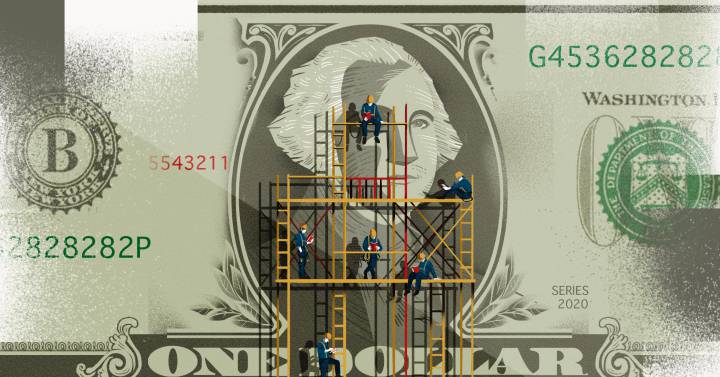A few days after the bankruptcy of Lehman Brothers, the giant American investment bank, in September 2008, a cowardly French president, the conservative Nicolas Sarkozy, made famous statements that rumbled throughout the world: “Self-regulation to resolve all Problems are over: le laissez-faire c'est fini . We must re-capitalize (...) because we have passed two fingers of the catastrophe. ”
That critical moment in which everything seemed possible, including the bankruptcy of the system, was overcome. The financial sector, to bars and ravines, came out of the crisis by means of shovels and shovels of public aid (in the form of money, guarantees, guarantees, purchases of bad assets, almost infinite liquidity at very low prices, etc.), and those verbs that they voluntarily conjugated over and over again - refusing capitalism, reforming capitalism, regulating capitalism, embrying capitalism, etc. - they forgot. From the Great Recession there was a time of "secular stagnation" (Larry Summers), which is what we are living. From the first, most of the citizens came out poorer, more unequal, much more precarious, less protected and with two political characteristics that largely explain what is taking hold before our eyes: more distrustful (in the governments, the parties, parliaments, companies, banks, risk rating agencies ...) and less Democrats. The result has been the explosion of populism of the extreme right and the decomposition of the binary system of political parties that came out of the Second World War, and an instrumental conception - not a finalist - of democracy: I will support democracy while solving my problems; If not, I am indifferent.
The main debate is whether capitalism is taken to death or is stronger than ever.
After that hiatus of almost a decade, when enough time distance begins to exist to analyze the effects of the Great Recession as a sequence of events that have led to a gigantic negative redistribution of income and wealth in reverse in the within the countries (the so-called Matthew effect : “The one who has the most will be given the most, and the one who has the least will be removed to give it to the one who has the most”), it is the academics and not the politicians who multiply theories on the characteristics of capitalism of the first quarter of the 21st century and they star in a great extreme debate among them: if capitalism is touched by death because it does not work; or, on the contrary, if once again in history it is mutating in nature and that transformation will lead it to be again the strongest and most unique political-economic system. There are two coincidences in most of the published books: capitalism has spread to all the geographical scenarios of the planet and directions (it has no alternatives), and nests in any activity and market, including politics.
Capitalism is now the only socioeconomic system on the planet (formerly this was called imperialism) and there are hardly any traces of communism as a substitute possibility, as happened in the first half of the twentieth century. To this central characteristic is added the rebalancing of economic power between the US and Europe on the one hand and Asia on the other due to the boom experienced by the main countries of the latter region. The planetary dominance exercised by capitalism has been achieved through its different variants. Some authors distinguish between liberal meritocratic capitalism, which has been gradually developing in the West over the past 200 years, and political or authoritarian capitalism exemplified by China, but which also exists in other Asian countries (Singapore, Vietnam ...) and some from Europe and Africa (Russia and Caucasians, Central Asia, Ethiopia, Algeria, Rwanda ...).
In recent times another typology has become popular, which has had its moment of glory at the World Economic Forum held in Davos in the month of January this year. The Davos 2020 Manifesto basically develops three types of capitalism: that of shareholders, for which the main objective of companies is profit maximization; State capitalism, which relies on the public sector to manage the direction of the economy, and the stakeholder capitalism , or capitalism of interested parties, in which companies are the administrators of society, and for this they must comply with a series of conditions such as paying a fair percentage of taxes, zero tolerance for corruption, respect for human rights in their global supply chain or defense of competition on equal terms, also when they operate within the "platform economy".
It evolves towards an economy and a democracy of 1%, for 1% and for 1%
Until now, shareholder capitalism has been widely hegemonic. He received a very strong theoretical support in the early sixties, when the main ideologist of the Chicago School, Nobel laureate Milton Friedman, wrote his book Capitalism and Freedom , in which he stated: “The main responsibility of companies is to generate Benefits". Friedman sacralized this rule of the game through various articles that tried to correct some veleities born in the US about the extension of business objectives to the so-called "corporate social responsibility." In shareholder capitalism, the predominance is of the short term and of the stock exchange, which ultimately led to the "financialization" of the economy.
This dominant philosophy has lasted practically until today. Recently, the British Academy published a report on the company of the 21st century, the result of the collective initiative of about thirty social scientists under the baton of Oxford professor Colin Mayer, who spoke of “redefining the companies of the 21st century and build trust between companies and society ”. And the American Business Roundtable, an association created at the beginning of the seventies of the last century in which the main directors of 180 large companies of all sectors sit, published a statement in which it de facto revoked the lonely criterion of the maximization of benefits in business decision making, replacing it with a more inclusive one that also took into account the well-being of all stakeholders: “Attention to workers, their customers, suppliers and communities in those that are present. " Soon, the main journalistic bibles of capitalism, Financial Times , The Economist, The Wall Street Journal , began to analyze this change that is not due to the benevolence and compassion of the executives of the big companies, but to the fear of demonization of Current and corporate capitalism, due to its excesses: excessive financialization, poorly managed globalization, increasing market power, multiplication of inequalities. Capitalism has gone too far and does not respond to problems such as the latter or the climatic emergency. Recently, a survey prepared by Gallup and published in The Economist revealed that almost half of young Americans prefer some kind of "socialism" to rampant capitalism. This may explain what is happening around Bernie Sanders in the Democratic Party primaries.
Today's capitalism is a toxic capitalism and is in crisis at least since the Great Recession began in 2007. In trend terms, capitalism has encouraged rapid growth; in relation to income per capita , it has enriched the world almost constantly (with mountain peaks) and the current life expectancy practically doubles that of, for example, two centuries ago. It has been the American psychologist Steven Pinker one of those who have developed these positive trends: “If you thought the world was coming to an end, this interests you: we live longer and health accompanies us, we are freer and, in short , happier; and although the problems we face are extraordinary, the solutions lie in the ideal of the Enlightenment: the use of reason and science ”( In defense of the Enlightenment ; Paidós). Using the figures, Pinker shows that life, health, prosperity, security, peace, knowledge and happiness have been increasing not only in the West, but throughout the world.
Why do many scientists argue that capitalism does not work, despite Pinker's descriptions? Essentially because different inequalities do not stop growing, they polarize societies and endanger the quality of democracy. In some of the texts it is argued that really existing capitalism is incompatible with democracy: it increases the citizen's feeling that civilization as we know it, based on democracy and debate, is threatened. What makes the current situation particularly worrying is that the space for that debate is shrinking; there seems to be a "tribalization" of opinions not only about politics, but about what are the main social problems and what to do with them.
Everyone has the right to have their own opinions, but not their own facts
The main credential of capitalism - improving everyone's standard of living uninterruptedly - is in question. For those who stay on the road, capitalism is not working well. For example, half of the generation born in the eighties is flatly worse than the generation of their parents at the same age. The anxiety, anger and despair of those age cohorts (and that of those over 45 who are out of work) shatter the political loyalties of yesteryear, whatever their ideological sign. The syndrome of personal decline begins with the loss of a satisfactory job. The apotheosis of current capitalism is due, to a large extent, to the growing weakness of the power of the labor force (wage earners and trade unions). Since before the Great Depression of the thirties of the twentieth century it had not happened again, on such a large scale, that the wealthiest segment of society would keep a larger portion of income. Joseph Stiglitz says, referring to the US but with almost universal validity, that "we evolved in a resolute way towards an economy and a democracy of 1%, for 1% and for 1%." That is why the Nobel Prize for Economics abominates Donald Trump's policy and thinks that the active public policies that should be practiced are the antithesis of existing ones, a kind of contemporary mix of Teddy Roosevelt (Republican President) and Franklin Delano Roosevelt (Democratic president). The gaps that split society are so deep (between the countryside and the city, qualified elites and those who have not had access to higher education, the rich of the poor, men and women, and the gap in expectations they harbor the middle classes ...) that believes that gradualism to close them is inadequate because this is a time of fundamental changes in which drastic transformations are needed within a solid democracy that restrains the political power of wealth concentrated in few hands. Blind and erroneous confidence in the "drip economy" must be abandoned, which preaches that, in the end, everyone benefits from dripping. Empirical experience says that the benefits of growth often do not reach everyone.
From the set of books analyzed, a strong idea follows: a plea against abusive capitalism of our day, which governs the elites. There is the power to rebuild the foundations of capitalism, but it does not have a viable alternative, and those that have been tried to put into practice have been worse and, in some cases, much worse. You have to run away from what Paul Krugman calls the "zombie ideas", ideas that are tumbling, dragging feet and devouring people's brains despite having been refuted by evidence. For example, the insistent (and ideological) idea that taxing the rich is highly destructive to the economy as a whole, or that tax cuts at high incomes will generate miraculous economic growth. Or that of those who oppose governments to play a greater role in the management of the economy, arguing that this role is not only immoral, but also counterproductive and even tumorous. And if the data does not support your opinion, they attack both the data and those who present it.
Krugman is not optimistic because he understands that, in our day, accepting what the data say about an economic issue is seen, in many cases, as a partisan act; Even asking certain questions is also considered a partisan act. He relies on sociologist David Patrick Moynihan, when he wrote that "everyone has the right to have their own opinion, but not their own facts."
Reading so much literature about the saga and flight of current capitalism allows us to establish an analogy between “the end of history” of Fukuyama, from the early nineties, and the “end of capitalism” of the twenties of the 21st century. That security that would give the victory of liberalism over authoritarianism has become a global insecurity and multiplication of individual vulnerability. The economy cannot be separated from politics if it is intended to advance in an accurate examination of the circumstances. The economy is too important to be left alone to economists.
'CAPITALISM. NOTHING ELSE'
Author: Branko Milanovic.
Translation: Teófilo de Lozoya and Juan Rabasseda Gascón.
Editorial: Taurus, 2020. On sale April 2.
Format: soft cover (368 pages) and ebook.
Find it in the editorial
'GOOD ECONOMY FOR DIFFICULT TIMES'
Authors: Abhijit V. Banerjee and Esther Duflo.
Translation: Marta Valdivieso Rodríguez and Ramón González Férriz.
Editorial: Taurus, 2020. On sale on March 26.
Format: soft cover (496 pages) and ebook.
Find it in your nearest bookstore
'CAPITAL AND IDEOLOGY'
Author: Thomas Piketty.
Translation: Daniel Fuentes.
Editorial: Deusto, 2019.
Format: hardcover (1,248 pages) and ebook.
Find it in your nearest bookstore
'PROGRESSIVE CAPITALISM'
Author: Joseph E. Stiglitz.
Translation: Jaime Enrique Collyer Canales.
Publisher: Taurus, 2020.
Format: soft cover (496 pages) and ebook.
Find it in your nearest bookstore
'THE FUTURE OF CAPITALISM'
Author: Paul Collier.
Translation: Ramón González Férriz / Marta Valdivieso Rodríguez.
Editorial: Debate, 2019.
Format: soft cover (352 pages) and ebook.
Find it in your nearest bookstore
'AGAINST ZOMBIES'
Author: Paul Krugman.
Translation: Yolanda Fontal Rueda.
Editorial: Crítica, 2020.
Format: hardcover (464) and ebook.
Find it in your nearest bookstore
'EXCESSES'
Author: Emilio Ontiveros.
Editorial: Planet, 2019.
Format: soft cover (320) and ebook.
Find it in your nearest bookstore
'DOES CAPITALISM WORK?'
Authors: Jacob Field and Matthew Taylor.
Translation: Cristóbal Barber Casasnovas.
Publisher: Blume, 2019.
Format: soft cover (144 pages).
Find it in your nearest bookstore
'SHADES. THE FINANCIAL DISORDER IN THE AGE OF GLOBALIZATION '
Authors: Michael Ash and Francisco Louça.
Translation: Roser Garí Pérez, Javier Maestro and Adrián Sánchez.
Publisher: Sylone, 2019.
Format: soft cover (416).
Find it in your nearest bookstore
'CIVILIZED UNTIL DEATH'
Author: Christopher Ryan.
Translation: Lucia Barahona.
Editorial: Captain Swing, 2020.
Format: soft cover (296 pages).
Find it in your nearest bookstore
'CAPITALISM. CRISIS AND REINVENTION '
Author: Ramón Casilda Béjar.
Editorial: Tirant Humanidades, 2019.
Format: hardcover (532 pages).
Find it in your nearest bookstore















/cloudfront-eu-central-1.images.arcpublishing.com/prisa/IGZ7GOCXZ5GUPAQ2HWGK6Z76BU.jpg)